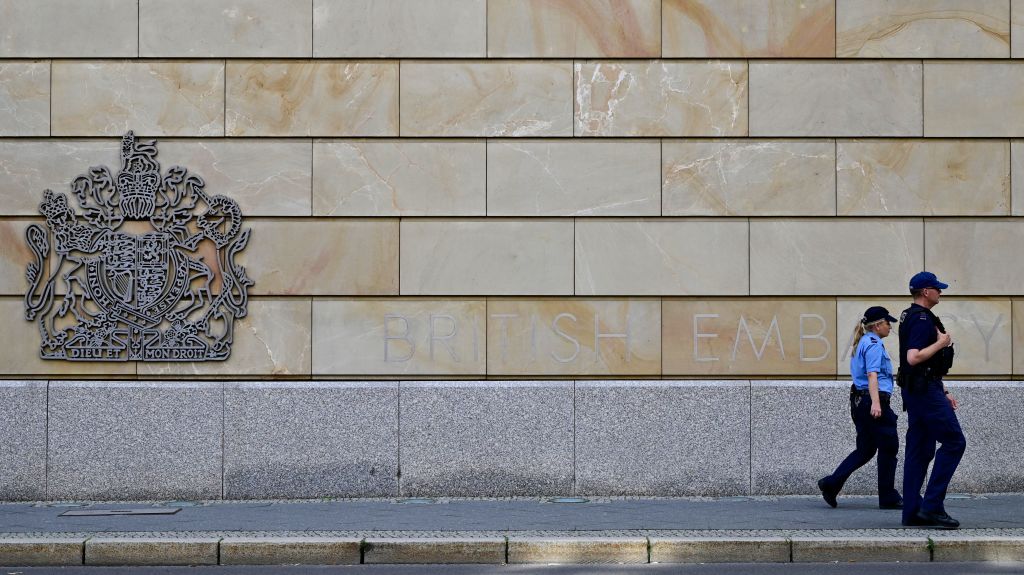Last week’s arrest of a security guard employed at the British embassy in Berlin, on suspicion of spying for Russia, serves as a stark reminder that the UK and its allies are in the thick of a new Cold War.
With the fall of the Berlin Wall in 1989 and the subsequent collapse of communist regimes, it appeared that the East-West stand-off had come to an end. Nato allies breathed a collective sigh of relief and looked to new horizons, believing their principal objective had been achieved and that Russia’s days as a superpower were consigned to the history books.
There can be little doubt that a second Cold War has crept upon our largely unsuspecting world
But in the intervening 30 years, after the initial hardships of the 1990s and the accession of Putin as president, Russia has sought to re-establish itself on the world stage. There can be little doubt that a second Cold War has crept upon our largely unsuspecting world. This is not just technological warfare, and in fact the old tactics of espionage and men on the ground are also in full swing.
Perhaps we have been too arrogant in the West to see what has really been going on. The warnings have been present for the past 20 years. Putin’s opponents have been exiled, imprisoned and even assassinated. The poisonings of Alexander Litvinenko and Sergei and Yulia Skripal serve as a reminder that the old ways of the Cold War are very much still alive. These poisonings were reminiscent of the 1978 murder of Georgi Markov, who was stabbed with an umbrella containing a deadly dose of ricin as he boarded a London bus at the height of the first Cold War.
Despite all the high-tech developments in espionage, the old methods of gathering information through contacts, informants, and agents seem to prevail. The latest drama in Berlin amply demonstrates this.
When researching my book, Stonehouse: Cabinet Minister, Fraudster, Spy, about the Labour cabinet minister John Stonehouse and espionage within the British government at the height of the Cold War, it was evident that the KGB-trained StB (Czech security services) put considerable effort into the recruitment of trade unionists, military and security personnel and politicians. The purpose of this was not simply to glean sensitive information but to garner support and influence at the very top of the British government. Stonehouse and other politicians of that time were paid by the Czechs and Soviets to question government policy in the House of Commons and attempt to influence change to benefit those behind the Iron Curtain. The Czechs skilfully groomed their targets, using politicians’ egos to trap them with a combination of flattery, advice and cash to promote their own political ambitions.
Today, the Russians continue to use the familiar tactics of divide and rule. In recent years they have been targeting Nato and the European Union in particular. Recently leaked documents revealed Russia’s positive view of Trump and his outspoken scepticism of a number of international alliances including Nato, which led to the Russians’ subsequent manipulation of social media with lies and misinformation in Trump’s favour ahead of the 2016 presidential election. There is also reasonable suspicion that the UK’s decision to leave the EU may have received some form of Russian interference. Couple these with Russia’s recent employment of media bloggers to spread false information about the AstraZeneca vaccine and you would be forgiven for believing in the resurgence of an East-West conflict.
There is though a new player today. Nato allies are naturally wary and ever conscious of the growing economic and political influence that China has in the developing world, where Chinese money is used to build massive infrastructure projects. Even the UK has not been immune to this trend with the recent Huawei 5G network contract controversy.
That the Czechs and the Soviets could recruit agents within our political system showed not only their considerable tenacity and guile, but also the weaknesses within our own democracy. Politicians had their price. That they were so corruptible during the Cold War does not auger well for our current crop of politicians, who are mired in allegations of sleaze and greed. That our politicians and those working closely with them continue to be susceptible to recruitment by foreign powers or large corporations should come as no surprise – just look at David Cameron and the Greensill saga. We all have a duty to look behind the rationale of any government decision to ensure the purest of motives. The recent inexplicable decision to award Huawei the UK 5G network contract must be questioned. Who made that initial decision? What was the rationale behind it? Has the decision been tainted by any external influences? We all must remain vigilant, question everything and ensure that we do not sleepwalk into a new Cold War trap.






Comments